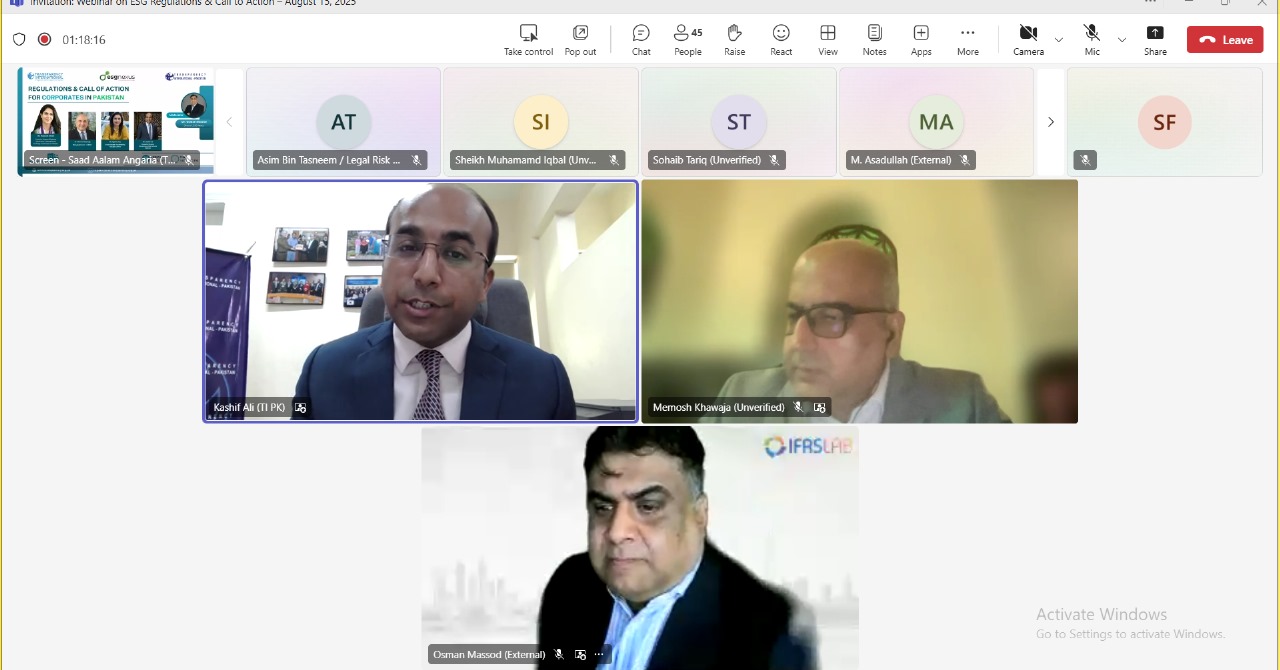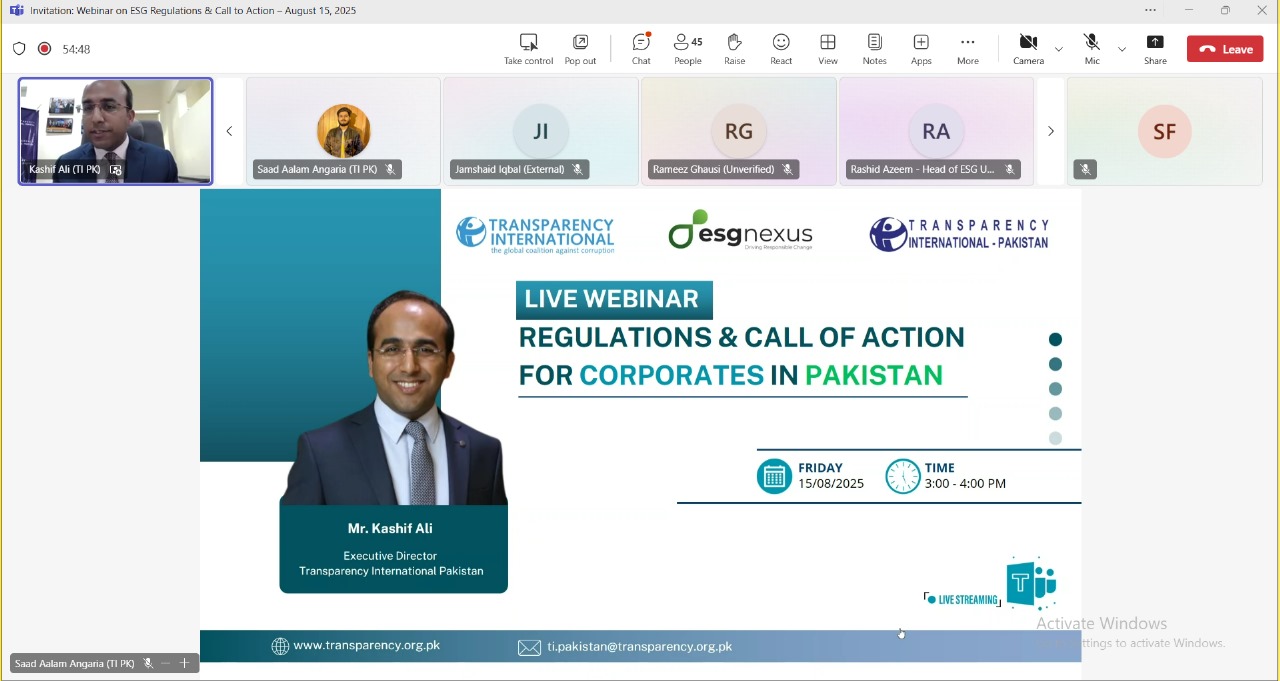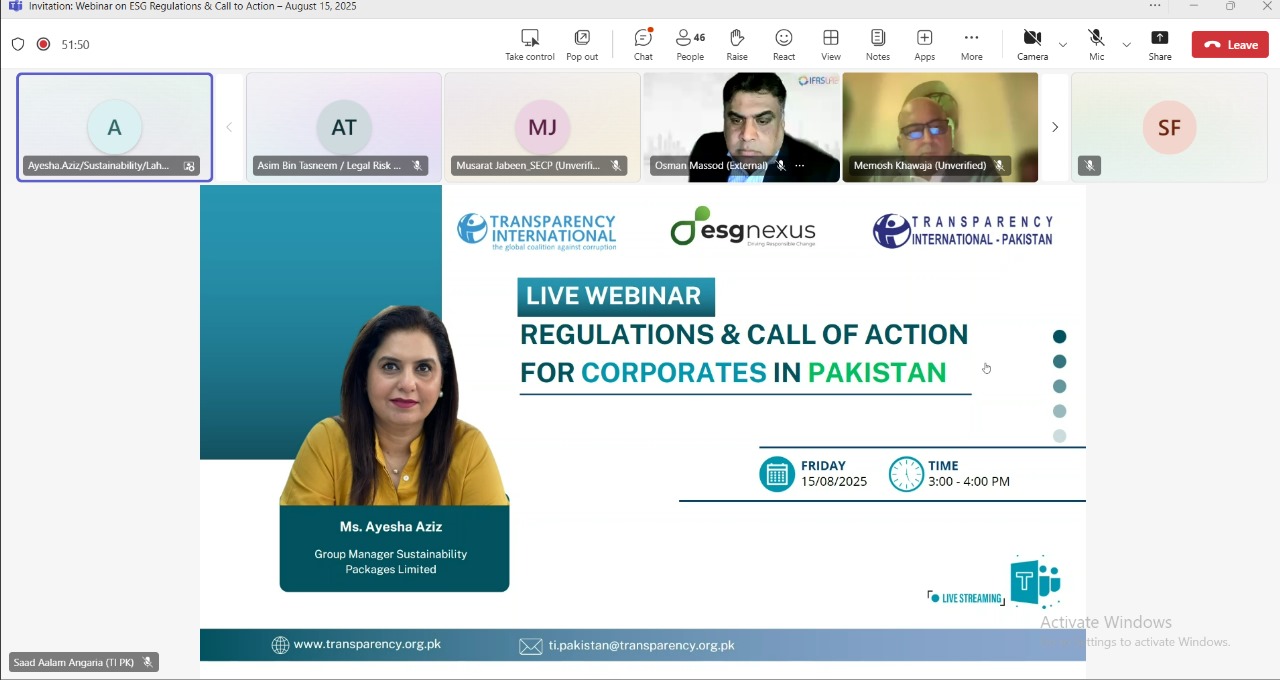Webinar: Regulations and Call to Action for Corporates in Pakistan
Webinar: Regulations and Call to Action for Corporates in Pakistan
Date: 15 August 2025
Organized by: Transparency International Pakistan and ESG Nexus
Transparency International Pakistan, in collaboration with ESG Nexus, convened a high-level dialogue on 15 August 2025 titled “Regulations and Call to Action for Corporates in Pakistan.” The online event brought together regulators, corporate leaders, sustainability professionals and representatives of civil society to discuss the evolving environmental, social and governance landscape in the country and to reflect on how businesses can respond to regulatory developments and increasing global expectations.
The session opened with a welcome by the moderator, Mr. Osman Masood, Director of ESG Nexus, who explained the objectives of the discussion and underlined the growing significance of ESG compliance in shaping the competitiveness and resilience of Pakistani companies. He noted that the webinar aimed to examine the regulatory context, explore business implications, and highlight the role of collaboration between regulators, corporates and civil society.
Delivering the keynote address, Ms. Mussarat Jabeen, Executive Director of the Securities and Exchange Commission of Pakistan (SECP), highlighted the strong regulatory progress that has been made in recent years. She explained the phased adoption of international sustainability disclosure standards, the operational launch of the ESG Sustain Portal, and the alignment of regulatory guidelines with national climate and green finance priorities. She emphasized that transparent ESG reporting has become the foundation for building investor confidence and securing access to global markets, describing it as the currency of trust in today’s economy. Ms. Jabeen called upon corporate boards and executives to act decisively by aligning early with global disclosure standards, embedding ESG into strategic oversight, investing in systems and staff training, actively reporting through the Sustain Portal, and collaborating with peers to strengthen the overall reporting ecosystem.
The panel discussion that followed provided a multi-stakeholder perspective on the barriers and opportunities for ESG integration in Pakistan. Mr. Memosh Khawaja, Managing Director of ILM Net, spoke about the challenges companies face in embedding sustainability into their strategies. He noted that while regulations are evolving, many businesses remain hesitant because they do not clearly see the economic benefits of ESG adoption. He stressed the need for more local data, case studies and concrete evidence linking ESG to financial returns in order to motivate companies to act. He also distinguished between firms that have fully embedded ESG into corporate strategy, those that maintain separate sustainability initiatives, and the majority who continue with business as usual with limited consideration of ESG.
Ms. Ayesha Aziz, Group Manager Sustainability at Packages Limited, pointed to gaps in Pakistan’s regulatory and disclosure framework. She highlighted the absence of mandatory ESG reporting, the inconsistency of corporate disclosures across sectors, and the insufficient integration of climate risk into governance practices. She urged companies to move beyond reactive compliance and to play an active role in shaping regulations through dialogue and advocacy. She also emphasized the need for stronger internal governance systems that can ensure long-term accountability and value creation. She also shared Packages Journey on ESG reporting and highlighted the company’s commitment at board level for clear ESG reporting.
Mr. Kashif Ali, Executive Director of Transparency International Pakistan, drew on the findings of the Transparency in Corporate Reporting 2024 assessment to demonstrate how limited progress has been made in actual practice. He explained that fewer than half of the top listed companies in Pakistan are fully complying with existing ESG guidelines and that a lack of standardized disclosures continues to undermine transparency. He underlined the role of civil society in bridging this gap through monitoring, advocacy and public engagement, and called for greater accountability to ensure that corporate sustainability commitments are meaningful and measurable.
During the interactive question and answer session, participants raised issues about corporate readiness for mandatory reporting, the extent to which capital markets can incentivize ESG adoption, and the importance of sector-specific guidance and training programs. The discussion underscored that while Pakistan has made significant strides in regulatory reforms, these must be matched by corporate action supported by evidence, data, capacity building and cross-sector partnerships.
Closing remarks were delivered by Ms. Raima Mehmood, Policy and Research Coordinator TI Pakistan who summarized the main messages of the webinar and emphasized that Pakistan must now move from compliance to competitiveness by integrating ESG into the very core of business strategy. She observed that regulatory foundations are in place but that progress depends on the willingness of companies to act decisively. Ms. Shahana Kaukab, Board of Trustee of Transparency International Pakistan, concluded the session with a vote of thanks to the speakers, the participants and the organizers, reaffirming the organization’s commitment to promoting transparency, accountability and sustainable corporate governance in Pakistan.
The webinar concluded with a clear consensus that ESG transparency is no longer optional but an essential requirement for Pakistan’s integration into global financial markets. While regulatory institutions have taken important steps, implementation continues to lag and businesses must shoulder the responsibility of closing this gap. The session highlighted that collaboration between regulators, corporates and civil society is the key to positioning Pakistan as a credible and competitive player in the global sustainability transition.







